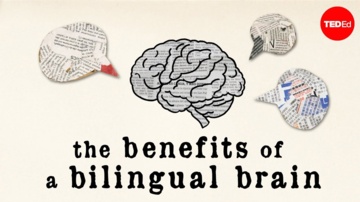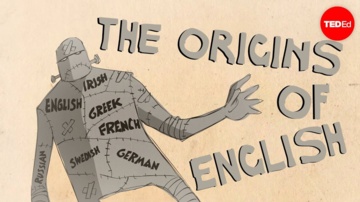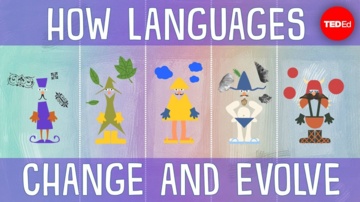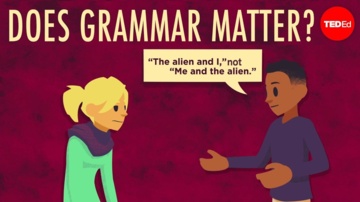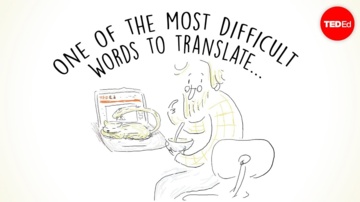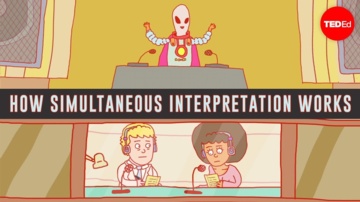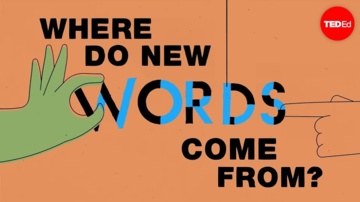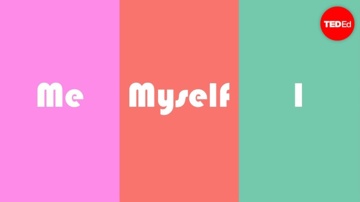1. The Benefits of a Bilingual Brain
It's obvious that knowing more than one language can make certain things easier — like traveling or watching movies without subtitles. But are there other advantages to having a bilingual (or multilingual) brain? Mia Nacamulli details the three types of bilingual brains and shows how knowing more than one language keeps your brain healthy, complex and actively engaged.
2. Where Did English Come From?
When we talk about 'English,' we often think of it as a single language. But what do the dialects spoken in dozens of countries around the world have in common with each other, or with the writings of Chaucer? Claire Bowern traces the language from the present day back to its ancient roots, showing how English has evolved through generations of speakers.
3. Are Elvish, Klingon, Dothraki and Na'vi Real Languages?
What do Game of Thrones' Dothraki, Avatar's Na'vi, Star Trek's Klingon and LOTR's Elvish have in common? They are all fantasy constructed languages, or conlangs. Conlangs have all the delicious complexities of real languages: a high volume of words, grammar rules, and room for messiness and evolution. John McWhorter explains why these invented languages captivate fans long past the rolling credits.
4. How Languages Evolve
Over the course of human history, thousands of languages have developed from what was once a much smaller number. How did we end up with so many? And how do we keep track of them all? Alex Gendler explains how linguists group languages into language families, demonstrating how these linguistic trees give us crucial insights into the past.
5. Does Grammar Matter?
It can be hard sometimes, when speaking, to remember all of the grammatical rules that guide us when we're writing. When is it right to say "the dog and me" and when should it be "the dog and I?" Does it even matter? Andreea S. Calude dives into the age-old argument between linguistic prescriptivists and descriptivists — who have two very different opinions on the matter.
6. One of the Most Difficult Words to Translate
As simple as it seems, it's often impossible to accurately translate the word you without knowing a lot more about the situation where it's being said. Krystian Aparta describes the specific reasons why it can be difficult, citing examples from many different languages.
7. How Interpreters Juggle Two Languages at Once
Language is complex, and when abstract or nuanced concepts get lost in translation, the consequences may be catastrophic. Given the complexities of language and cultural exchange, how do these epic miscommunications not happen all the time? Ewandro Magalhaes explains how much of the answer lies with the skill and training of interpreters to overcome language barriers.
8. How to Use a Semicolon
As simple as it seems, it's often impossible to accurately translate the word you without knowing a lot more about the situation where it's being said. Krystian Aparta describes the specific reasons why it can be difficult, citing examples from many different languages.
9. How Did English Evolve?
What is the difference between "a hearty welcome" and "a cordial reception?" In a brief, action-packed history of the English language, Kate Gardoqui explains why these semantically equal phrases evoke such different images.
10. Where Do New Words Come From?
There are over 170,000 words currently in use in the English language. Yet every year, about a thousand new words are added to the Oxford English Dictionary. Where do they come from, and how do they make it into our everyday lives? Marcel Danesi explains how new words enter a language.
11. A Brief History of Plural Word... s
All it takes is a simple S to make most English words plural. But it hasn't always worked that way (and there are, of course, exceptions). John McWhorter looks back to the good old days when English was newly split from German – and books, names and eggs were beek, namen and eggru!
12. Buffalo Buffalo Buffalo: One-Word Sentences and How They Work
'Buffalo buffalo Buffalo buffalo buffalo buffalo Buffalo buffalo' is a grammatically correct sentence. How? Emma Bryce explains how this and other one-word sentences illustrate some lexical ambiguities that can turn ordinary words and sentences into mazes that mess with our minds.
13. When to use "me", "myself" and "I"
Me, myself, and I. You may be tempted to use these words interchangeably, because they all refer to the same thing. But in fact, each one has a specific role in a sentence: 'I' is a subject pronoun, 'me' is an object pronoun, and 'myself' is a reflexive or intensive pronoun. Emma Bryce explains what each role reveals about where each word belongs.
14. How Computers Translate Human Language
Is a universal translator possible in real life? We already have many programs that claim to be able to take a word, sentence, or entire book in one language and translate it into almost any other. The reality, however, is a bit more complicated. Ioannis Papachimonas shows how these machine translators work, and explains why they often get a bit mixed up.

